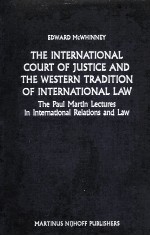图书介绍
THE INTERNATIONAL COURT OF JUSTICE AND THE WESTERN TRADITION OF INTERNATIONAL LAWPDF|Epub|txt|kindle电子书版本网盘下载

- 著
- 出版社: MARTINUS NIJHOFF PUBLISHERS
- ISBN:9024735246
- 出版时间:1987
- 标注页数:159页
- 文件大小:7MB
- 文件页数:173页
- 主题词:
PDF下载
下载说明
THE INTERNATIONAL COURT OF JUSTICE AND THE WESTERN TRADITION OF INTERNATIONAL LAWPDF格式电子书版下载
下载的文件为RAR压缩包。需要使用解压软件进行解压得到PDF格式图书。建议使用BT下载工具Free Download Manager进行下载,简称FDM(免费,没有广告,支持多平台)。本站资源全部打包为BT种子。所以需要使用专业的BT下载软件进行下载。如BitComet qBittorrent uTorrent等BT下载工具。迅雷目前由于本站不是热门资源。不推荐使用!后期资源热门了。安装了迅雷也可以迅雷进行下载!
(文件页数 要大于 标注页数,上中下等多册电子书除外)
注意:本站所有压缩包均有解压码: 点击下载压缩包解压工具
图书目录
Chapter Ⅰ:The Challenge to 'Classical' International Law1
(a) The objection of Eurocentrism3
(i) Acquisition of territorial title by European 'discovery'5
(b) The objection of Colonialism8
(i) The special legal regime of Extraterritoriality in China8
(ii) Economic imperialism in Latin America:the Calvo and Drago Doctrines9
(iii) A duty of economic redress,and a New International Economic Order11
(c) The Soviet Union,and 'new' or 'contemporary'International Law12
(i) New imperative legal principles:Coexistence/Friendly Relations12
(ii) 'New' International Law,and 'contemporary'International Law15
(iii) Customary International Law newly up-graded16
Chapter Ⅱ:Nature and Definition of International Law in an Era of Transition20
(a) 'Classical' Sources,and new conceptions of Lawas-Fact and Law-as-Process20
(i) Contemporaneity of the non-contemporaneous in International Law doctrine today:the 'old'and the 'new' textbooks21
(ii) Complexities as to normativity in contemporary International Law-Making25
(iii) Cross-currents and contradictions as to Sources and Processes in contemporary International Law-Making28
(iv) Trend and directions in the definition of law today31
(b) General Theory of Law:Legal Positivism,Legal Realism and Sociological Jurisprudence32
(i) On the vocation of our times for a new General Theory of International Law32
(ii) Disappearance of the single-author,comprehensive International Law texts33
(iii) The positivist tradition of International Law and Legal Science35
(iv) Legal Realism,and new Sociological approaches to International Law and Law-Making40
(v) The Sociological and Policy-Science schools in conflict over International Law47
Chapter Ⅲ:The Emerging Constitutionalism of World Order,and the International Court55
(a) United Nations Charter:Treaty or Constitution?55
(b) Democratic Constitutionalism:emergence of the U.N.General Assembly58
(c) Reception of American constitutional ideas:the World Court and judicial Law-Making65
(d) Evolution of the World Court:elections of judges73
(i) 'Regional' trends in judicial elections75
(ii) Some emerging voting patterns in judicial elections80
(e) Western retreat from the Court83
(i) Withdrawal from compulsory jurisdiction83
(ii) Recourse to Arbitral tribunals85
(iii) Special Chambers of the Court,and the issue of choice of judges86
(f) Third World discovery of the Court93
Chapter Ⅳ:Contemporary Crisis of the World Court:International Adjudication and International Legal Problem-Solving99
(a) The Nicaragua v.United States of America processes,1984-198699
(b) Chronology of political-legal events in the Nicaragua processes,1984-1986100
(c) The U.S.Government's objections to a World Court role in Nicaragua v.United States102
(d) Nicaragua v.United States,Merits:the legal rationale109
(i) Significance of the U.S.multilateral treaty eservation110
(ii) The issue of 'justiciability',and the Law/Politics dichotomy111
(iii) The non-appearance of the Respondent,United States117
(iv) The claimed right of intervention by a Third Party,El Salvador119
(v) The objection of 'interest' advanced against certain national judges120
(e) U.N.Charter Law,and the applicability of general,Customary International Law123
(f) The substantive-legal holdings of the Court's Merits ruling127
(g) The innovative character of the Merits decision:Jus Cogens,Law-as-Fact,and 'Judge and Company'129
(i) Non-use of Force and Non-intervention,as Jus Cogens129
(ii) Law-as-Fact,and new approaches to 'Sources' of International Law131
(iii) 'Judge and Company':the Court and other international law-making authorities132
Chapter Ⅴ:The Future of International Adjudication and International Law137
(a) Some myths and realities in current critiques of the Court137
(i) The alleged anti-Western majority on the Court137
(ii) The alleged 'Marxist-Leninist' behaviour of Soviet and Eastern European judges on the Court138
(iii) The alleged 'ganging-up' by the Third World States in the election of judges139
(b) The law/politics dichotomy,and the limits and possibilities of the judicial process140
(c) 'Judge and Company':Court,General Assembly,Secretary-General,and Security Council143
(d) Constitutional-legal linkage:relevance of Definition and General Theory of Law144
(e) The problem of normativity:changing international law values in an era of transition146
(f) 'Reception' of Western general legal ideas:the 'internationalisation' of the International Court and International Law149
Index155